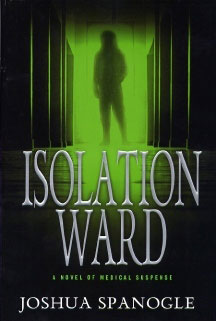 |
 Joshua Spanogle
Joshua Spanogle
Isolation Ward
Reviewed by: Rick Kleffel © 2006
Delacorte Press / Random House
US Hardcover First Edition
ISBN 0-385-33853-8
Publication Date: 03-07-2006
391 Pages; $22.00
Date Reviewed: 03-11-06
Index:
Mystery
General Fiction
Science Fiction
The conventions of a genre can confine or liberate an author. This becomes even more true when a writer works within a specifically defined subgenre. Space opera, for example, can offer infinite opportunities for either invention or cliché. Sub-genre fiction can be a lot more specific and limiting than space opera; the medical thriller is the perfect example. These books are enormously profitable, wildly popular and usually as vacant as a shopping mall parking lot on Super Bowl Sunday. By definition, the medical thriller is quite limited, and in practice even more so.
But there's no lack of potentially riveting material available; it's just not being effectively used. Joshua Spanogle opens up the field by gene-splicing noir DNA into the medical thriller to come up with 'Isolation Ward', an entertaining and often thought-provoking novel that works entirely within the confines of the medical thriller subgenre. Spanogle's first novel succeeds by offering readers an unlikable lead character and a murky mix of medical and noir ethics. He writes with the light hand that readers expect from these books, but offers some intriguing complications. 'Isolation Ward' is a fine first novel that heralds an exciting career.
'Isolation Ward' starts where the title would lead you to expect. A mysterious disease is breaking out in Baltimore. It's a hemorrhagic fever with all the unpleasant symptoms. Nate McCormick is one of the first wave of CDC investigators to arrive on the scene and he starts by making more enemies than friends. Talk about brusque -- McCormick jaunts right past brusque. As the patterns of the disease reveal themselves, McCormick's investigation offers him a lot of room to be rude. He capitalizes on this, and finds himself seemingly sidelined, sent to San Jose, California to follow up on an unimportant lead. Once there, McCormick makes more enemies and proves that he's harder to sideline than the powers that be would prefer.
Spanogle has an easy-to-read style that's smooth and exciting. Chapters are short and the pace is fast but not frenetic. It's not a disease-breakout novel, but a mystery wrapped around a disease breakout. Spanogle's got a good sense of irony and humor, which he uses frequently enough to keep the ball rolling and not so often as to seem jokey. The prose is clean enough to keep the reader focused on the events and immersed in the action.
Carrying the action is a cast of characters that is more memorable than one expects to find. Nate McCormick tells the story in the first person. He's filled with self-conflict and self-doubt and self-confidence. He has a short fuse and blows up often enough to spout some entertainingly bad bedside manners. He engages in the medical equivalent of noir-detective bad-boy behavior and is both punished and rewarded. 'Isolation Ward' is not exactly a noir, but it clearly benefits from the influence.
When you’re done with this book, you'll be rather amazed at how well Spanogle has drawn the rest of his cast. Herb Verlach, Nate's Baltimore CDC partner, cop John Meyers, and McCormick's CDC politico-boss Timothy Leary Lancaster are all sharply etched and enjoyable in any scene that requires them. Alaine Chen, the femme fatale from McCormick's past is nicely counterbalanced by Brooke Michaels, also from his past, the (of course) hot-babe blonde who plays Nora to Nate's Nick. Add in his mentor, Doctor Harriet Tobel, and Nate gets triangulated between three women. It's a nice touch that makes the novel easy to map in the reader's mind. Even the more minor characters are memorable, mired as they are in Spanogle's ethics soup.
Layers of ethical conflicts keep 'Isolation Ward' consistently thought provoking while the pages turn. Medicine, business, research, the one versus the many, the knight-errant versus the establishment -- they all get threaded together with just enough attention to ensure the reader's brain is as engaged as the fingers turning the pages. Spanogle isn't forging into new territory so much as he's mining terra cognito with his own flair and entertainingly rude style. McCormick has the medical version of the noir hero's shady past and bad attitude. So you get scenes where instead of roughing up suspects, he's roughing up the mentally handicapped. Yes, he's repugnant, but he's the kind of repugnant a reader can get behind. And Spanogle is admirably skilled at showing all sides while siding with no side. Things are what they are, and what they are is imperfect with the potential to get much worse or much better, depending on what you, the reader think is important. Spanogle studiously works in shades of grey.
'Isolation Ward' offers readers enough medical and scientific details to satisfy your need for engorged tonsils and disturbing symptoms without verging into the hot zone where the reader will experience disturbing symptoms. If you want that sort of detail, this is not the place to find it, which will probably suit most readers just fine. 'Isolation Ward' does go a bit further into action-hero territory than it needs to, though it's certainly exciting. The Nick & Nora show that Spanogle spins with Nate and Brooke is thoroughly enjoyable, enough so that readers will hope to see the two of them together again, even if Brooke is a hot California blonde. And the ethical morass that is modern medicine offers Spanogle plenty of room to explore in a suitably dark, noir fashion. 'Isolation Ward' displays enough of Spanogle's writerly skill and talent to suggest that it will not be an isolated success.
|
 |
